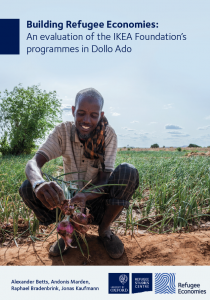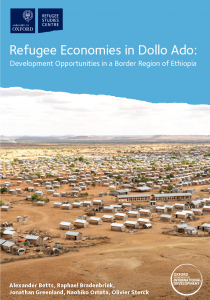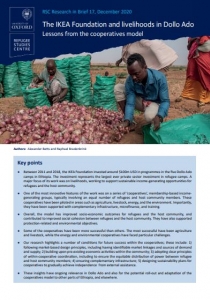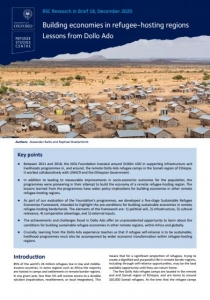alt=""
Credit: R. Bradenbrink
Dollo Ado
The private sector and refugee livelihoods.
Between 2011 and 2019, the IKEA Foundation invested around $100m to support a range of programmes in the five Dollo Ado refugee camps in Ethiopia. This was the largest private sector investment in refugee camps in the history of the refugee system, and a particular focus was on refugee livelihoods, notably through an innovative ‘cooperatives’ model. In 2019, we undertook an independent impact evaluation.
Between 2009 and 2011, hundreds of thousands of Somali refugees crossed into Ethiopia, fleeing a mixture of conflict, famine and drought. International organisations set-up a humanitarian response near the border town of Dollo Ado. The surrounding area was arid and isolated, with limited infrastructure. Five refugee camps soon emerged, which today host 160,000 refugees. Initially, the camps offered few opportunities.
During a seven-year period, the IKEA Foundation committed around $100m to support UNHCR in piloting an alternative model of refugee assistance, based on building the local economy and supporting sustainable livelihood opportunities for both refugees and the nearby host community. The investment represents the largest ever private sector investment in refugee camps.
One of the model’s key innovations has been a series of ’cooperatives’ – membership-based income-generating groups. The cooperatives typically involve an equal number of refugees and host community members. Members receive vocational training and access to basic inputs, and usually share profits among the group. The intention is that, over time, external support can be reduced, and members will have access to sustainable livelihoods. Cooperatives have been created in areas such as agriculture, livestock, energy and the environment, and microfinance.
The IKEA Foundation’s work in Dollo Ado is unprecedented in its attempt to use private sector investment to promote market-based development in a refugee-hosting region. We find that some of the cooperatives have been more successful than others, and those that have been the most successful have tended to have stronger market linkages, and be in areas in which there is a pre-existing local demand. Overall, though, the cooperatives model has improved the income and living standards of thousands of refugees and host community members in and around the Dollo Ado camps.
The approach demonstrates the potential for the United Nations to collaborate with the private sector, offers crucial insights into how to build sustainable economies in remote refugee-hosting regions, and provides a starting point for reimaging refugee assistance beyond encampment.
In addition to the impact evaluation report, we are pleased to bring you our new short documentary film. The film highlights the key findings and lessons learned from the multi-year collaboration of the IKEA Foundation, UNHCR, and the Government in the Dollo Ado refugee camps. Drawing upon our impact evaluation, the film provides a unique insight into the livelihoods programmes that have been implemented in the five Dollo Ado refugee camps.
Produced by the Refugee Studies Centre, Oxford. Written by Raphael Bradenbrink and Alexander Betts. Directed by Raphael Bradenbrink





